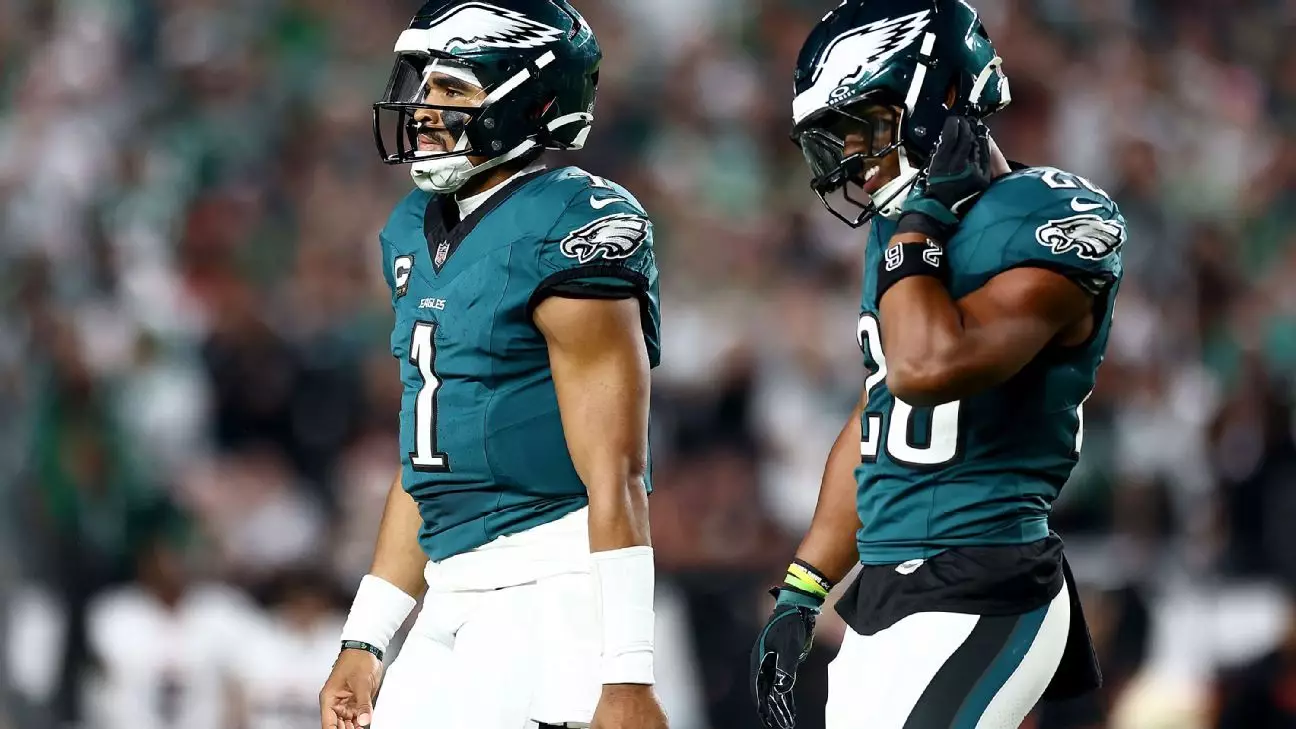The glow of victory for the Philadelphia Eagles dimmed abruptly following a heartbreaking loss to the Atlanta Falcons in a closely contested game that showcased both the potential and pitfalls of team dynamics. As the clock wound down and the tension escalated, it was clear that the game hinged on a crucial moment—one that placed the spotlight solely on running back Saquon Barkley.
In an emotionally charged post-game interview, Barkley took full responsibility for his missed catch, stating, “I let my team down today.” His words resonate not only as an acknowledgment of personal error but also as a reflection of the broader narrative of sportsmanship and leadership within a team environment. The play in question occurred during a pivotal moment with less than two minutes left, where a successful catch could have guaranteed an Eagles victory. Instead, the ball slipped through his fingers, leaving Philadelphia in a precarious position that ultimately resulted in a 22-21 defeat.
His candidness illustrates a hallmark of effective leadership—a willingness to own up to mistakes. Notably, this accountability can foster trust among teammates, reinforcing the understanding that success is a collective endeavor. Barkley’s assertion, “If I make the catch, the game is over,” underscores the interconnected nature of each team member’s contributions and the ripple effect a single error can have.
As the game progressed, the Eagles held a slender three-point lead. Coach Nick Sirianni faced a critical decision on a third down with three yards to gain. Instead of opting for a run play—often considered a safer bet—Sirianni chose to pass in a bid to exploit a perceived defensive vulnerability. Despite the decision-making reasoning, which aimed to sidestep a congested defense, the outcome reveals the inherent risks associated with such calls in high-pressure situations. Statistics from ESPN Analytics painted a compelling picture: had the Eagles run the ball on third down for no gain, their chances of winning the game would have remained above 96%.
This scenario poses essential questions about coaching philosophies and in-game decision-making. When should risk-taking be balanced with the pragmatism of conventional strategies? While the intention behind passing was to secure a more favorable position, hindsight often serves as a stern teacher. The lesson here is clear; sometimes, sticking to the fundamentals can yield a higher probability of success.
The relationship between players, particularly that of a quarterback and a running back, is foundational in shaping a team’s performance. Jalen Hurts, demonstrating his unwavering support for Barkley, asserted, “I trust [Barkley] every day of the week to make a play.” Such trust between players is crucial, providing a bedrock of reliability that can bolster overall team morale. Hurts’ confidence in Barkley signals a culture wherein teammates rally around each other, even in the face of failure.
Barkley, despite the setback, is resolute in his approach; he recognizes the need to learn, adapt, and move forward. His declaration, “I could sit here and complain… or I could be a professional athlete and go back to the drawing board,” reinforces the idea that setbacks are merely stepping stones in the journey of growth. Acknowledging mistakes is vital, but it is the response to those mistakes that often defines a player’s trajectory and a team’s future success.
As the Eagles prepare to face the New Orleans Saints in a tight timeline, the episode serves as a poignant reminder of the volatile nature of professional sports. Every game presents unforeseen challenges, and growth typically comes wrapped in lessons of both triumph and defeat. Barkley and his teammates are tasked not just with recovering from this loss but with refining their strategies and solidifying their bond.
It would be unwise for the Eagles to linger too long on disappointment; rather, they must transform this moment of reflection into motivation and resilience. Each game is an opportunity for redemption, a chance to reinforce team unity and face adversity head-on. In the world of professional football, where every second counts, the capacity for change and adaptation is what ultimately determines success. As the Eagles regroup, their journey forward will hinge on learning from mistakes and solidifying the trust that binds them together as a team.

